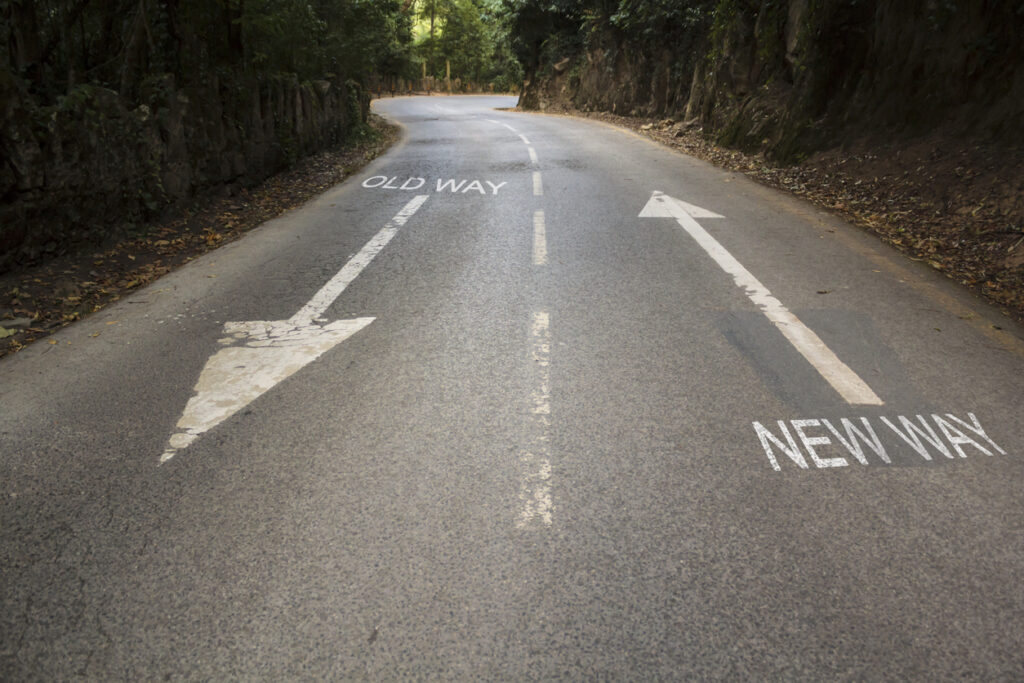Adaptability is an attractive quality. We all like to think of ourselves as being flexible and adaptable, a team player, ‘going with the flow’. It means that we are not rigid or stuck and so are open to change and challenge.
If you were to ask most people if they consider themselves to be open and adaptable, they would say ‘yes’. If you truly are adaptable then you are more likely to handle change with grace and ease, and not be thrown by the unexpected and be a lot happier. Yet most of us are actually a lot more resistant to change than we might believe.
Adaptability is more than being flexible – it is about being open to things, even outside our comfort zone, and not making pre-conceived judgments such as ‘I could never do that’ or ‘that will be too hard for me’. It’s about resilience and emotional intelligence.
We cannot afford to think we know everything either. Something new will come along and blow that out of the water, whether it is a new technology, a new process or a new plan.
Leaving your comfort zone
Adaptability is about continually developing more of what we are truly capable of and living up to our potential. This is critical for our skills now and in the future. Unfortunately, it also something we may well talk ourselves out of more than we think we do.
Change is difficult because we want to stay inside our comfort zone and will resist anything that requires us to step out of it. Therefore, a conscious effort is needed to do this for those of us less open to change, and even for those of us who are.
The best way to develop adaptability, or any behavourial change for that matter, is by practicing it in everyday ‘low stake’ situations.
Our comfort zones are basically as small or as big as we make them. We make them bigger by engaging in more activities, tasks, thoughts and experiences that lie outside of our comfort zone. The bigger our comfort zone, the more adaptable we will be.
The comfort zone is where everything is easy and nothing risky ever happens. Equally, nothing great or exciting happens there either.
Just outside your comfort zone is the ‘stretch zone’, where learning and growth happen. This is the place that can feel a little uncomfortable because you might be stretching yourself in new and different ways, but you’re still able to manage. It’s not easy but not impossibly hard either.
However, if you go too far in this direction you’ll reach the panic zone, which is not a good place to be, as the name might suggest. Learning and growth can’t happen here because we are so far out of the comfort zone that we find ourselves in ‘fight or flight’ mode.
The stretch zone is the best place to be. One of the most effective ways to increase your ability to be adaptable is to ensure you are spending plenty of time there.
Stretch yourself in small ways
I believe that the best way to develop adaptability, or any behavourial change for that matter, is by practicing it in everyday ‘low stake’ situations.
When we talk to people on our workshops about simple ways they might try to go out of their comfort zone they invariably come up with big challenges. In fact, the best way to get into the stretch zone is through doing small incremental things each day.
Try and build up your ability to adapt and respond positively by literally changing your behaviour next time you are faced with a change.
Seemingly small things like changing your route to work, saying ‘yes’ to something you might normally say ‘no’ to automatically, or trying a different and unfamiliar food are relatively low-stake situations that can then help you to move towards higher-stake ones.
Here are some other ways:
- Look for opportunities to try new things that will keep you learning.
You can do this in very small ways to start with – try learning a new skill, make new friends, try a new type of food, take the initiative for starting something in your community.
As your comfort zone expands, make it bigger by doing more. Take on new challenges for work and seek them out. Embrace change, even if it feels uncomfortable at first. Reinvent yourself.
- Even though it is natural to want to resist change, try and build up your ability to adapt and respond positively by literally changing your behaviour next time you are faced with a change.
Again, start with small steps. You feel disappointed because of a change of plan? Respond enthusiastically even if you don’t feel like doing so. Couldn’t get tickets for a show you wanted to see? Smile and choose something completely different so you can embrace a new experience. Lost your job? Get upset, yes, but bounce back faster by taking positive action each and every day.
- Research suggests that people who are able to come up with solutions to a problem are better able to cope with problems than those who can’t.
Whenever you encounter a new challenge, make a quick list of some of the potential ways you could solve the problem. Experiment with different strategies and focus on developing a logical way to work through common problems.
By practising these skills on a regular basis, you will be better prepared to cope when a serious challenge emerges.
Looking for more tips? Read Coping with uncertainty: how you can improve
Adaptability is an attractive quality. We all like to think of ourselves as being flexible and adaptable, a team player, ‘going with the flow’. It means that we are not rigid or stuck and so are open to change and challenge.
If you were to ask most people if they consider themselves to be open and adaptable, they would say ‘yes’. If you truly are adaptable then you are more likely to handle change with grace and ease, and not be thrown by the unexpected and be a lot happier. Yet most of us are actually a lot more resistant to change than we might believe.
Adaptability is more than being flexible – it is about being open to things, even outside our comfort zone, and not making pre-conceived judgments such as ‘I could never do that’ or ‘that will be too hard for me’. It's about resilience and emotional intelligence.
We cannot afford to think we know everything either. Something new will come along and blow that out of the water, whether it is a new technology, a new process or a new plan.
Leaving your comfort zone
Adaptability is about continually developing more of what we are truly capable of and living up to our potential. This is critical for our skills now and in the future. Unfortunately, it also something we may well talk ourselves out of more than we think we do.
Change is difficult because we want to stay inside our comfort zone and will resist anything that requires us to step out of it. Therefore, a conscious effort is needed to do this for those of us less open to change, and even for those of us who are.
The best way to develop adaptability, or any behavourial change for that matter, is by practicing it in everyday ‘low stake’ situations.
Our comfort zones are basically as small or as big as we make them. We make them bigger by engaging in more activities, tasks, thoughts and experiences that lie outside of our comfort zone. The bigger our comfort zone, the more adaptable we will be.
The comfort zone is where everything is easy and nothing risky ever happens. Equally, nothing great or exciting happens there either.
Just outside your comfort zone is the ‘stretch zone’, where learning and growth happen. This is the place that can feel a little uncomfortable because you might be stretching yourself in new and different ways, but you’re still able to manage. It’s not easy but not impossibly hard either.
However, if you go too far in this direction you’ll reach the panic zone, which is not a good place to be, as the name might suggest. Learning and growth can’t happen here because we are so far out of the comfort zone that we find ourselves in ‘fight or flight’ mode.
The stretch zone is the best place to be. One of the most effective ways to increase your ability to be adaptable is to ensure you are spending plenty of time there.
Stretch yourself in small ways
I believe that the best way to develop adaptability, or any behavourial change for that matter, is by practicing it in everyday ‘low stake’ situations.
When we talk to people on our workshops about simple ways they might try to go out of their comfort zone they invariably come up with big challenges. In fact, the best way to get into the stretch zone is through doing small incremental things each day.
Try and build up your ability to adapt and respond positively by literally changing your behaviour next time you are faced with a change.
Seemingly small things like changing your route to work, saying ‘yes’ to something you might normally say ‘no’ to automatically, or trying a different and unfamiliar food are relatively low-stake situations that can then help you to move towards higher-stake ones.
Here are some other ways:
- Look for opportunities to try new things that will keep you learning.
You can do this in very small ways to start with – try learning a new skill, make new friends, try a new type of food, take the initiative for starting something in your community.
As your comfort zone expands, make it bigger by doing more. Take on new challenges for work and seek them out. Embrace change, even if it feels uncomfortable at first. Reinvent yourself.
- Even though it is natural to want to resist change, try and build up your ability to adapt and respond positively by literally changing your behaviour next time you are faced with a change.
Again, start with small steps. You feel disappointed because of a change of plan? Respond enthusiastically even if you don’t feel like doing so. Couldn’t get tickets for a show you wanted to see? Smile and choose something completely different so you can embrace a new experience. Lost your job? Get upset, yes, but bounce back faster by taking positive action each and every day.
- Research suggests that people who are able to come up with solutions to a problem are better able to cope with problems than those who can’t.
Whenever you encounter a new challenge, make a quick list of some of the potential ways you could solve the problem. Experiment with different strategies and focus on developing a logical way to work through common problems.
By practising these skills on a regular basis, you will be better prepared to cope when a serious challenge emerges.
Looking for more tips? Read Coping with uncertainty: how you can improve








